Jonathon’s Story: From Survival to Stability
Living on the streets with my 8-year-old daughter was terrifying. Every day we struggled for water, food, and safety—but the greatest fear was losing her simply because we were homeless.
Living on the streets with my 8-year-old daughter was terrifying. Every day we struggled for water, food, and safety—but the greatest fear was losing her simply because we were homeless.
The Street Medicine Institute welcomes Dr. Qi Charles Zhang as Clinical Director! 
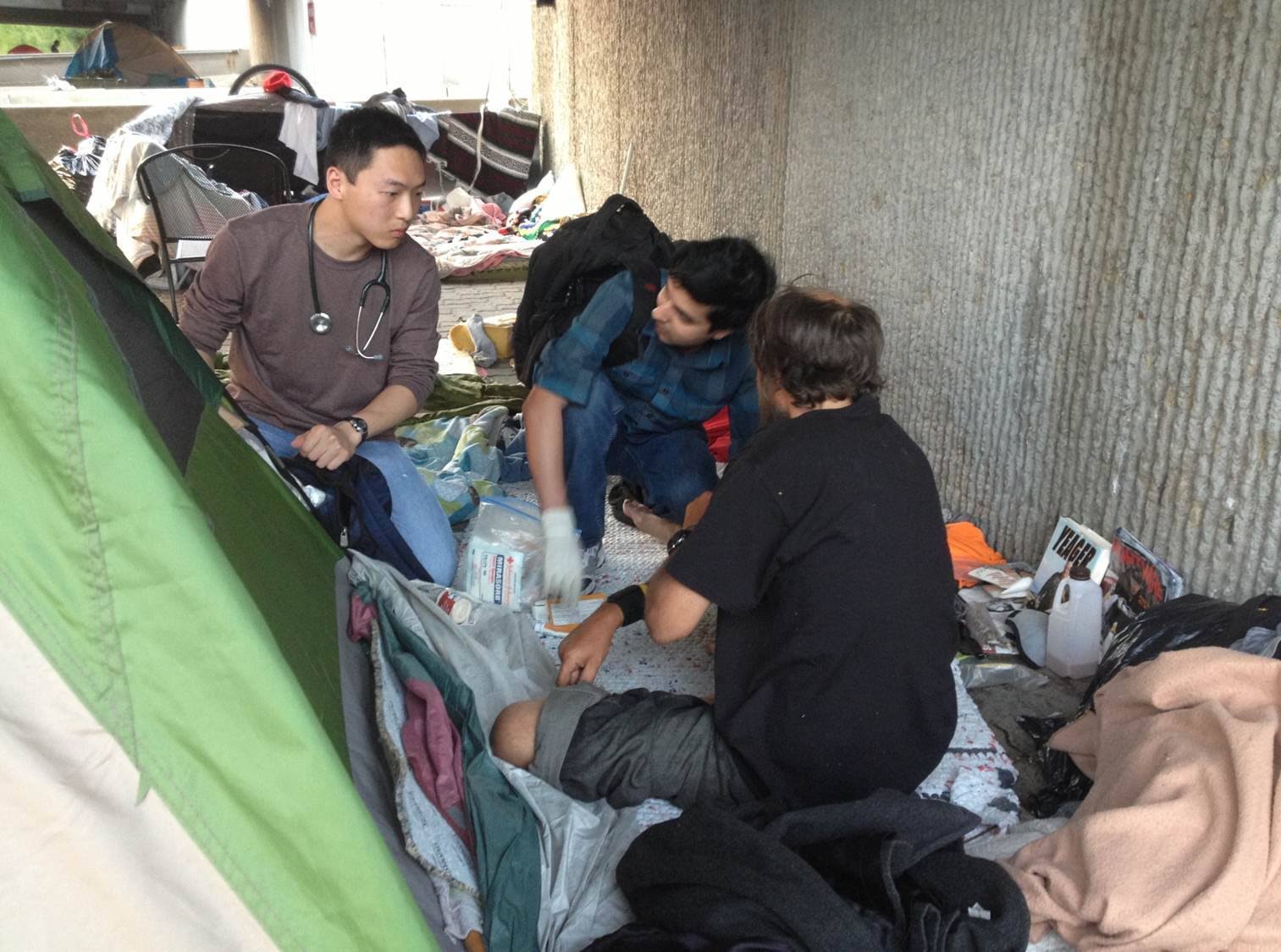
 This past June 30th and July 1st, I was given the tremendous honor of being asked to speak in Aspen Colorado to commemorate Dr. Albert Schweitzer’s visit and lecture there in 1949. It was also Albert Schweitzer’s 150th birthday. For those of you not familiar with the great Dr. Schweitzer, he was one of us. His life of service as a physician in a remote clinic in what is now the nation of Gabon embodied his love for those without access to healthcare. With skill and dedication, he created a hospital in the tiny town of Lamberene, initially using an abandoned shed with no electricity or other resources. Earlier in his life, he was a renowned scholar and musician but chose to become a physician in order to more directly serve those in greatest need. Due to his German citizenship, he was captured during WWI, but his patients forced the French to release him to continue his work. In Africa, he had a mystical realization while watching hippos swimming into a river that led him to his philosophy of “Reverence for Life.” His living example and his writings and lectures became an inspiration to the world. Not long after his visit to Aspen (his only visit to the US), he was awarded the Nobel Peace Prize. Dr. Schweitzer was an inspiration to both me and my father, so I eagerly agreed to speak at the event. The more I read not just about Dr. Schweitzer's medical work, but his profound philosophy, the more I recognized the same core values we hold in street medicine. I have experienced, and heard many of you describe, a mystical experience when we see ourselves in the eyes of our sisters and brothers on the streets. My talk attempted to weave our reverence for the reality of those we serve together with Dr. Schweitzer’s Reverence for Life. Indeed, the two are essentially the same.
This past June 30th and July 1st, I was given the tremendous honor of being asked to speak in Aspen Colorado to commemorate Dr. Albert Schweitzer’s visit and lecture there in 1949. It was also Albert Schweitzer’s 150th birthday. For those of you not familiar with the great Dr. Schweitzer, he was one of us. His life of service as a physician in a remote clinic in what is now the nation of Gabon embodied his love for those without access to healthcare. With skill and dedication, he created a hospital in the tiny town of Lamberene, initially using an abandoned shed with no electricity or other resources. Earlier in his life, he was a renowned scholar and musician but chose to become a physician in order to more directly serve those in greatest need. Due to his German citizenship, he was captured during WWI, but his patients forced the French to release him to continue his work. In Africa, he had a mystical realization while watching hippos swimming into a river that led him to his philosophy of “Reverence for Life.” His living example and his writings and lectures became an inspiration to the world. Not long after his visit to Aspen (his only visit to the US), he was awarded the Nobel Peace Prize. Dr. Schweitzer was an inspiration to both me and my father, so I eagerly agreed to speak at the event. The more I read not just about Dr. Schweitzer's medical work, but his profound philosophy, the more I recognized the same core values we hold in street medicine. I have experienced, and heard many of you describe, a mystical experience when we see ourselves in the eyes of our sisters and brothers on the streets. My talk attempted to weave our reverence for the reality of those we serve together with Dr. Schweitzer’s Reverence for Life. Indeed, the two are essentially the same.
 Jeff Olivet is an internationally recognized leader in public health and homelessness policy, with a deep focus on the intersection of housing, healthcare, and racial equity. As the executive director of the U.S. Interagency Council on Homelessness (USICH) from 2022-2024, he led federal efforts to address homelessness as a public health crisis, advocating for policies that integrate healthcare and housing solutions and that prevent homelessness before it starts. He currently serves as Senior Advisor to the Initiative on Health and Homelessness at the Harvard T.H. Chan School of Public Health and a consultant to numerous organizations in the United States and internationally.
Jeff Olivet is an internationally recognized leader in public health and homelessness policy, with a deep focus on the intersection of housing, healthcare, and racial equity. As the executive director of the U.S. Interagency Council on Homelessness (USICH) from 2022-2024, he led federal efforts to address homelessness as a public health crisis, advocating for policies that integrate healthcare and housing solutions and that prevent homelessness before it starts. He currently serves as Senior Advisor to the Initiative on Health and Homelessness at the Harvard T.H. Chan School of Public Health and a consultant to numerous organizations in the United States and internationally.

The Street Medicine Institute’s Seed Grant program furthers SMI’s mission of assisting communities to establish their own Street Medicine programs. The program facilitates and enhances the direct provision of health care to rough sleepers where they live by providing communities and clinicians with expert training, guidance, and support to develop and grow their own Street Medicine programs. We were delighted to have received a record twenty-nine deserving and qualified applications for the fifth year of this grant- evidence that street medicine is expanding across the United States.

The Street Medicine Institute’s Seed Grant program furthers SMI’s mission of assisting communities to establish their own Street Medicine programs. Now in its fourth year, the program facilitates and enhances the direct provision of health care to rough sleepers where they live by providing communities and clinicians with expert training, guidance, and support to develop and grow their own Street Medicine programs. We were delighted to have received a record twenty-two deserving and qualified applications in 2024.
 Kendall brings a wide range of executive leadership experience in social services, higher education, and cultural preservation. She began her career directing a shelter program and, since that time, has devoted her efforts to outreach services. Over her career, she has launched numerous programs to reduce barriers, increase inclusiveness, and bring dignity, hope, and support to the places where people need it the most. She has significant experience partnering with the medical community, including working in emergency departments, chairing several regional medical coalitions, and training medical professionals through the American College of Physicians, state medical associations, hospitals, medical schools, offices, and clinics.
Kendall brings a wide range of executive leadership experience in social services, higher education, and cultural preservation. She began her career directing a shelter program and, since that time, has devoted her efforts to outreach services. Over her career, she has launched numerous programs to reduce barriers, increase inclusiveness, and bring dignity, hope, and support to the places where people need it the most. She has significant experience partnering with the medical community, including working in emergency departments, chairing several regional medical coalitions, and training medical professionals through the American College of Physicians, state medical associations, hospitals, medical schools, offices, and clinics.
Dear Street Medicine Family, On June 28, 2023, word was received from CMS that a new unique POS code for Street Medicine was issued! It is POS 27 and is already listed on their website.
 There were many facets of the COVID-19 pandemic that considerably impacted the lives of persons experiencing homelessness. In response, individuals and families composing the homeless population adapted. The same was true for organizations serving the community. Shelters adapted their floor plans to increase “social distancing”; large-venue congregant shelters opened to accommodate the increased numbers of individuals who found themselves without housing; restrictions on outdoor camping were loosened which in turn made homelessness far more visible; cities struggled with new issues of allowing ‘tent cities’ in parks and parking lots regardless if they were officially sanctioned or not; agencies serving the population fiscally re-evaluated increased need for services with decreased funding from donations; everyone worried about the virus and simply surviving through the worst of the pandemic.
There were many facets of the COVID-19 pandemic that considerably impacted the lives of persons experiencing homelessness. In response, individuals and families composing the homeless population adapted. The same was true for organizations serving the community. Shelters adapted their floor plans to increase “social distancing”; large-venue congregant shelters opened to accommodate the increased numbers of individuals who found themselves without housing; restrictions on outdoor camping were loosened which in turn made homelessness far more visible; cities struggled with new issues of allowing ‘tent cities’ in parks and parking lots regardless if they were officially sanctioned or not; agencies serving the population fiscally re-evaluated increased need for services with decreased funding from donations; everyone worried about the virus and simply surviving through the worst of the pandemic.
Jim Withers, MD and Joel Hunt, PA 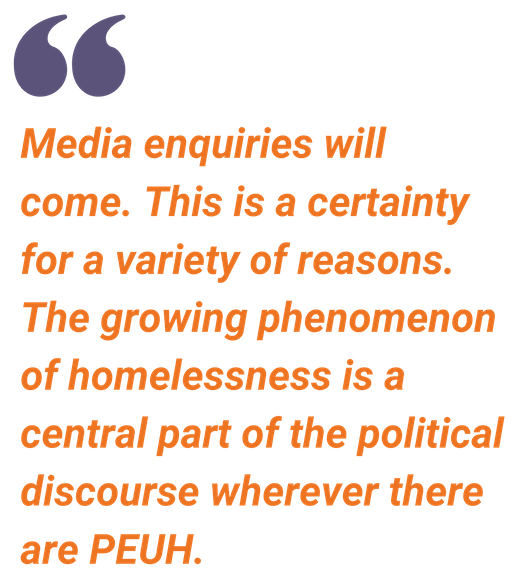 The act of providing direct medical care to those living on the streets is not just an important service, but one that provokes society. Time and again, street medicine programs activate the attention of the public and the media. This is an almost guaranteed part of the street medicine journey and deserves discussion. This paper is not a definitive work on the subject of media relations, but hopefully serves as a guide based on many decades of experience by street medicine experts.
The act of providing direct medical care to those living on the streets is not just an important service, but one that provokes society. Time and again, street medicine programs activate the attention of the public and the media. This is an almost guaranteed part of the street medicine journey and deserves discussion. This paper is not a definitive work on the subject of media relations, but hopefully serves as a guide based on many decades of experience by street medicine experts.

Dr. Jim Withers is the Founder of the Street Medicine Institute. The Institute evolved as an off-shoot of his groundbreaking work with Pittsburgh Mercy's Operation Safety Net, the street medicine program he established and continues to work with in Pittsburgh, PA. Dr. Withers describes his experience with street medicine in his Ted Talk here.
We are currently looking for more people who want to be involved with the Street Medicine Educator Coalition! Learn more about the Educator Coalition. Currently, we have opportunities for positions on our Leadership Team and Education Work Group.
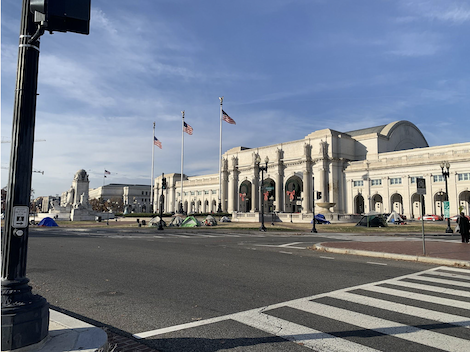 There’s something jarring about walking towards the U.S. Capitol and being surrounded by rows of tents that so many District of Columbia residents call home. Just blocks from the White House, there are encampments of people living without adequate shelter, access to food, or healthcare. In a city rich with resources and arguably the center of power in the United States, nowhere is it more obvious where we as a nation have made the political choice to intentionally value certain lives over others.
There’s something jarring about walking towards the U.S. Capitol and being surrounded by rows of tents that so many District of Columbia residents call home. Just blocks from the White House, there are encampments of people living without adequate shelter, access to food, or healthcare. In a city rich with resources and arguably the center of power in the United States, nowhere is it more obvious where we as a nation have made the political choice to intentionally value certain lives over others.
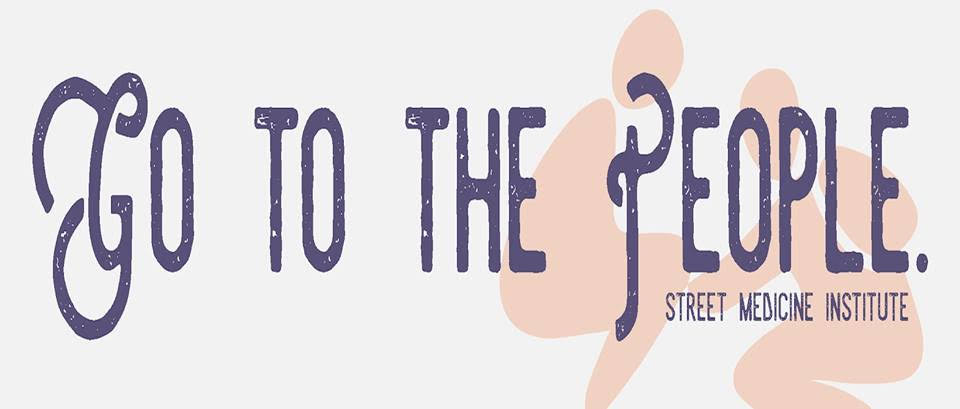
Dear Student Coalition,
The application process is now open, and all students are invited to apply for the 2022-2023 Street Medicine Institute Student Coalition (SMISC) Leadership Team! You will find the application link at the bottom of this message.
 I will be the first to admit it. Even though I am a “child of the sixties”, my personal and professional life have generally followed the straight and narrow. Yet, I always felt motivated by the challenging words and actions of John F. Kennedy, Martin Luther King, Jr, St. Teresa of Calcutta, and Paul Farmer. And, what about the admonition from the New Testament: “Whatsoever you do to the least of my brothers and sisters, so you do unto Me”? Even my high school teacher charted my trajectory with the adage “To whom much is given, much is to be expected”.
I will be the first to admit it. Even though I am a “child of the sixties”, my personal and professional life have generally followed the straight and narrow. Yet, I always felt motivated by the challenging words and actions of John F. Kennedy, Martin Luther King, Jr, St. Teresa of Calcutta, and Paul Farmer. And, what about the admonition from the New Testament: “Whatsoever you do to the least of my brothers and sisters, so you do unto Me”? Even my high school teacher charted my trajectory with the adage “To whom much is given, much is to be expected”.
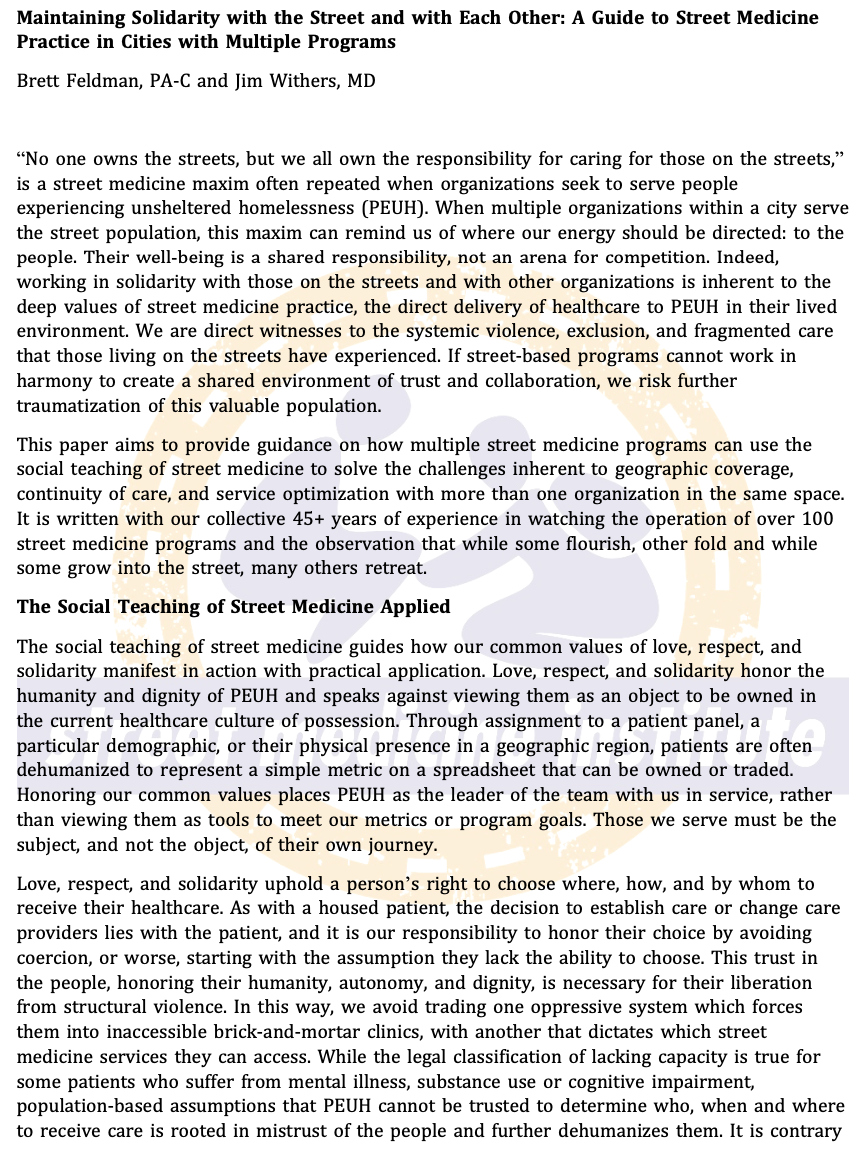 NEW RESOURCE -
NEW RESOURCE - As we approach the 18th International Street Medicine Symposium in Toronto this September, we thought it would be a good time to provide some background on our annual meeting. Around 2004, I was approached by a funder who wanted to support the replication of the “Operation Safety Net model” of street care. Although not entirely unique, it was one of only a few programs truly committed to full time medical street work. The first other program I learned about was Calcutta Rescue under the leadership of Dr. Jack Preger in India. When I visited Jack in December of 1993, the experience was an epiphany. I will never forget the feeling of realizing I was not alone. Prior to that, I thought I might be the only physician crazy enough to provide medical care under bridges. Even though Pittsburgh and Kolkata were radically different, the same forces of exclusion and the same passion for social justice were obvious. Not long thereafter, I learned of the Boston Healthcare for the Homeless program and the pioneering work of Jim O’Connell and his colleagues. After visiting them on street rounds, I knew this was a new field of medicine – even if it did not yet have a name.